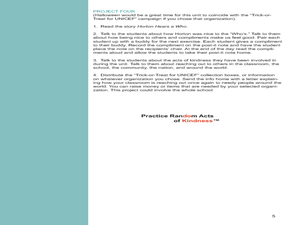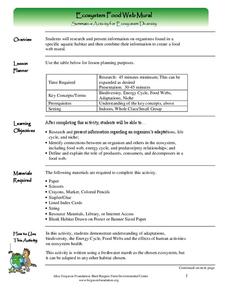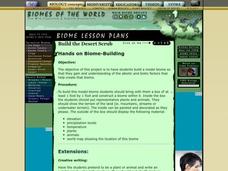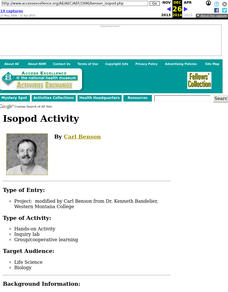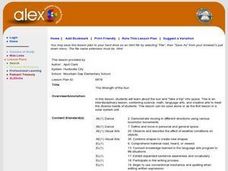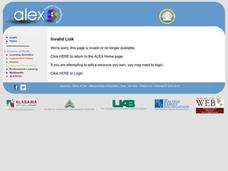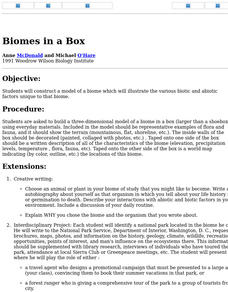Curated OER
Water and Ice
Learners explore the physical properties of water. In this water lesson, students explore water as it changes states. They observe, measure and use communication skills to describe change.
Curated OER
"Soapstone" Relief Sculpture
Students discuss what a relief sculpture is and the history of relief sculptures. Following the brief discussion and a demonstration, students have the opportunity to practice the relief carving technique.
Curated OER
Learning to Communicate with Dogs: The Importance of Training
Students learn the importance of communication especially when it comes to animals. Students are shown video clips of a dog displaying unwanted behavior. Students participate in a class brainstorm where they list ideas of how people...
Curated OER
Simple Machines, Engines and the Environment
Students examine and describe the six main simple machines. In groups, they work with an inclined plane to calculate the ideal and actual mechanical advantages of the plane. Using their results, they must determine the efficiency of the...
Curated OER
Bivalve Biology
Young scholars place clams into a beaker containing saltwater. They place a small drop of food coloring just above the shell. Students observe the movement of the food coloring. Clams are then placed into clean beakers of saltwater with...
Curated OER
Spreading Kindness All Around
Students donate items to organization to demonstrate kindness. In this kindness lesson plan, students read many books and discuss how the characters in each one demonstrate kindness, and then they themselves donate to charities.
Curated OER
Ecosystem Food Web Mural
Learners create a food web mural about an ecosystem of the freshwater marsh. For this food web lesson plan, students write about the organisms and how each one depends on another.
Curated OER
Hands On Biome-Building
Students create a model biome to understand the abiotic and biotic factors that go into creating a biome. In this biomes lesson plan, students should display plants, animals, temperature, precipitation, and more.
Curated OER
Hands on Biome--Building
Students create a model biome. In this ecology lesson, students use materials to create a model biome. There is an extension activity that allows students to write about plants and animals and their specific biome.
Curated OER
Build the Arctic Tundra
Students build a model of biome in order to comprehend the abiotic and biotic factors that are prevalent in a biome. In this hands on building lesson, students use a box to build a biome. . Students decorate the inside and outside of...
Curated OER
Hands On Biome-Building
Students create a desert biome to understand the abiotic and biotic factors of that biome. In this desert biome lesson plan, students include elevation, precipitation, temperature, plants, and more.
Curated OER
Isopod Activity
Students enter information and compare relationships that they are measuring.
Curated OER
The Nitrogen Cycle
Young scholars study the nitrogen cycle and construct a diagram. For this Earth Science lesson students use role play to see the various paths.
Curated OER
Investigating Fresh Water Ecosystems
Sixth graders examine the fresh water ecosystems. In this environmental lesson, 6th graders work in groups to collect information about a fresh water ecosystem and report their findings to the class in the form of a brochure.
Curated OER
Biotechnology in Agriculture: Non-surgical removal of fertilized embryos from the Bovine Uterus
Students simulate the step-by-step procedures needed to non-surgically remove embryos from the uterus of a superovulated cow using the Kalver training cow.
Curated OER
A Natural Habitat: What, How and Why
Students understand what a habitat is. They determine why a habitat is important to our environment no matter where it is located. Students observe and recognize natural habitats in their surroundings.
Curated OER
King Arthur's Family Tree
Students examine the genealogy of King Arthur. They create a poster of his family tree and shares with the class. They also place other key figures of the time period on the poster to put his life in perspective.
Alabama Learning Exchange
The Strength of the Sun
Students explore the sun and take a "trip" to outer space.
Alabama Learning Exchange
Goods and Services
First graders demonstrate the difference between goods and services.
Curated OER
Biomes -- Part II
Students use the internet to gather information on the biomes of the world. They identify the climate and unique characteristics of each biome along with any threat to them. They create their own campaign to preserve wildlife.
Curated OER
Making Ice Cream
Student examine the physical changes of matter and are able to describe them. They make ice cream in plastic bags to observe the changes in matter. They describe and record the changes in the ice cream mixture as it freezes.
Curated OER
Kindergarten Social Studies Lesson 4
Students examine the lives of children in other places. They listen to a read aloud of Eve Bunting's, Dandelions, and retell the story of the family living in the West. They talk about the sod houses and compare them to the types of...
Curated OER
Biomes in a Box
Students construct a three-dimensional model of a biome which illustrates the various biotic and abiotic factors unique to that biome. They use everday materials to represent the important characteristics of a particular biome and then...
Curated OER
Paper Puppet
Learners create hand puppets using basic art supplies, paper cups, cotton balls, and yarn in this 1st and 2nd grade Art lesson. Emphasis is placed on the history of puppets and puppetry. The lesson includes a short vocabulary list.







